emergency power newbie
I know almost nothing about emergency generators (gas or solar) so I thought I would present my situation to the forum folks in the hopes that someone can recommend a model that they have used and feel it will work for my application. Telling me I need 'this' type, with no models, will put me back into the rabbit hole I've been running in for awhile. :-)
I live in a house that has a natural gas furnace. I've lived here 30+ years with only one power outage more than a few hours - and that was only for a day. That tells me I shouldn't worry and do nothing. My friend, who has a generator, whom I would go to his house if need be - has moved out of state, so I feel my safety net that I only needed once needs a back-up plan. The other part of me says I really don't want to spend thousands of dollars on the one-off chance of a power outage lasting more than a few hours should occur in the winter (which is my only concern: I rarely use a/c in the summer, so the minor inconvenience in the summer wouldn't bother me much for a few days).
Should the power go out I would want the ability to power a space heater - even if just for one room - 24/7. Also, I would need to have my router working and have the ability to charge my smart phone a few times per day - and have access to a lamp during the evening hours. I'm pretty simple. Sure, I may loose some food in the fridge if the power goes out for more than a day - but I don't keep enough that I would fret about. As long as I, and my two dogs, were warm in one room - I'd do fine - living on the few non-perishables that I have set aside should this happen - and my phone would keep me connected to the outside world, along with being my source of entertainment.
Concerns: being a senior and not a strong person, my ability to pull-start something that is fine for a man may have its limitations. I do live in-town and perhaps a neighbor would pull start a gas powered unit for me - as long as it wasn't often where it would be an inconvenience. Although, I am guessing once it was running for several hours, restarting it would be something I could easily do myself - it's that first start that is always a killer for me. Whatever type you recommend, please provide the amount of gas it would require over the course of 24 hours for the above requirements - plus any other maintenance it would need to do (assuming a 3 day power outage - because anything more than that, I would plan to drive to my friend's house out of state, which I can do on a tank of gas - where he not only has a generator but a wood burning stove and is super mechanical, MacGyver-like - I'd want for nothing at his house :-). Hopefully, if a gas unit, it would be on the quiet side - I do live in-town so my neighbors are fairly close together. With it running 24/7 - well, if possible, a bit quieter would be ideal. The same thing for a solar unit: how long would it last over the course of 24 hour; charging, etc. I kind of understand the mechanics of a gas generator: keep it filled with gas and run an extension cord into the one room that I would be 'living in' - I'm guessing is all that I need to know. Solar is a bit more advanced, but I'd be willing to watch videos to understand how to operate them if a model was provided.
Again, since the odds of this ever happening is slim (but just my luck, now that my friend has moved) I would not want to spend much more than $500 for all that I would need.
Thanks all!!
Comments (33)
- 3 years ago
I've owned two generators, and my caveat to you is that they must be regularly maintained, especially as related to gasoline. Old gasoline in a generator that hasn't been used in a couple of years may result in a generator that won't start. A propane generator may be more dependable. A quick look at generators at Home Depot shows a few propane generators within your budget. The smaller the generator, the easier to start.
As an alternative, you could buy a small one panel solar panel system and a battery for less than the cost of a generator. We have one on our RV. We charge cell phones with it and I don't know why it couldn't power any low-voltage item like a router. Then for your temporary heat, I have a propane heater that attaches to a 20 lb. tank that I have used indoors. It puts out a lot of heat, is simple and easy. And it's just as safe as a gas oven. Do you have natural gas?
0dvd94 thanked Seabornman - 3 years ago
Because you didn't mention, I'll toss this into the equation: do you have a sump pump? If you do, in the "wet season" (typically Spring), how long can your sump not run before you have to worry about flooding? Most people worrying about generators have that as their #1 reason.
The #2 reason might be water. Are you on a well? If so, you'll want to be able to run the well pump, even of occasionally (to fill toilets, etc). If you're on city water, that's not a concern.
The #3 reason is food storage (refrigerator/freezer). Depending on how much spoiled food you can stand to throw out, that'll be a factor.
I'd consider "communications" (Internet, phone-charging, maybe TV boxes) as #4, but others may put that lower.
After that is heating, which need not be generator-based.
Once you ponder that, you can figure out the size you need and go from there.
You can get electric-start gas generators, but you have to maintain the battery, and as mentioned the fuel supply. In my experience, electric starts tend to fail right around the time you need them, never before.
We have a Generac whole-house 20kW model on propane, fully automatic. Can run everything for a good 3 days assuming my tanks are full. But that sounds way overkill for you. A much smaller one on natural gas (which you say you have running your furnace already), with a manual transfer switch and secondary panel (electrician-installed) might do. Get it supplied and installed by a reputable dealer/electrician, and maybe a maintenance contract (typically annual inspection), and you'll be essentially worry-free. But you're looking at a few thousand bucks installed.0dvd94 thanked Brad Smith Related Professionals
Kyle Landscape Architects & Landscape Designers · Oconomowoc Landscape Architects & Landscape Designers · Springfield Landscape Contractors · Mount Sinai Landscape Contractors · North Plainfield Landscape Contractors · Shoreview Landscape Contractors · South Lake Tahoe Landscape Contractors · Ramona Siding & Exteriors · Rockville Siding & Exteriors · Thornton Siding & Exteriors · Tarpon Springs Solar Energy Systems · University City General Contractors · Columbia Home Automation & Home Media · Herndon Home Automation & Home Media · Kansas City Home Automation & Home Mediadvd94
Original Author3 years ago@Seabornman: I presume you would attach a 20 gallon tank of propane to the generator that you mentioned? If so, how long will it run on that tank for the devices that I mentioned? How do they start? Please state the brand/model number of the propane heater that you recommend. Truthfully I am petrified of propane heaters - everyone says they can kill you while you are sleeping if you do not have sufficient oxygen in the room - and because I would be in just one room I would worry - even with the window open...reason being, my neighbor was killed by carbon monoxide from his propane heater and his house (8' from my own) burned to the ground. It will be a night etched in my mind for a lifetime. Of course I would invest in a detector for the room should I go that route.
@brad: no sump pump; have city water and sewer; I'm ok loosing food - I don't store much. What I need to run over the course of 3 days is spelled out in the original post. Can you recommend an electric start gas generator in my price range (make/model)? That actually sounds ideal, brad. I did not know they made them. Transfer switch/electrician - way too costly considering the odds of ever needed it, as mentioned in my post.Thank you!!
0- 3 years ago
Where do you live? I've lived in homes in the south that only had portable propane or natural gas heaters for heating. We ran them 24 hours a day during a cold snap. After re-reading your first post, you're hoping for 3 days of temporary heat which would mean having spare tanks. You have natural gas, so you could have a gas outlet installed and use a portable unit or a unit permanently mounted in the wall. The better ones have oxygen depletion and tip over sensors for safety. But if you're going to sleep in this room, someone's going to tell you how dangerous that is and as you've said you're not keen on that, maybe you should do something else.
If you're really considering a generator, here's one in your budget with electric start that can run off gas or propane. It has enough capacity to do what you want as well as power a 2000 watt electric space heater in the one room you want heated. Are you in an area that the pipes will freeze if you retreat to one room?
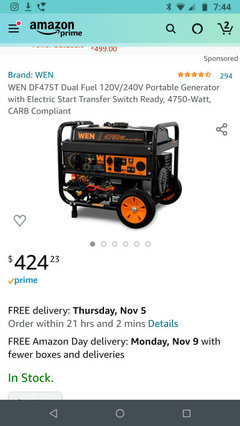 dvd94 thanked Seabornman
dvd94 thanked Seabornman - 3 years ago
We were without power for 12 hours when the remnants of Zeta passed through on Thursday. My 80KW generator ran the house just fine.
0dvd94 thanked Ron Natalie - 3 years ago
Solar power systems in your price range won't provide anywhere near enough energy for you to run a space heater, which pretty much leaves you with a gas or propane generator. And I'm with you on not wanting to run propane heaters indoors, so I'd look at definitely be looking at generators.
Assuming that you are fine with an extension cord or two, and you don't plan to connect it to your home wiring, you could go with something like this 3,500 watt Champion generator with electric start — and a remote! — which is $360, and should give you more than enough power to keep a space heater or two going along with various lamps, routers, etc.
https://www.tractorsupply.com/tsc/product/champion-power-equipment-3-500-watt-rv-ready-portable-generator-with-wireless-remote-start-epa-1353301?cm_mmc=feed--GoogleShopping--Product-_-1353301&gclid=Cj0KCQjwufn8BRCwARIsAKzP695EVs4Sd3Py943SyRhSG1FVZWNzXc1t3ZYmdsyyry_Jd3PHj3S9oa4aArLxEALw_wcB
Note that the Champion doesn't include the usual 240v outlet that you would use if you did every plan to put a transfer switch to connect it to your home wiring, you might be limited a little bit in doing that.
At our previous house, we used extension cords with our generator. Our current house was wired with a transfer switch, and I'll say that it is really nice during an extended power outage to just be able to connect the generator to our house wiring and have a half-dozen circuits powered, including the furnace and fridge and lights and electrical outlets. But you're probably looking at $1,000 — give or take a few hundred dollars, depending on where in the country you are — to have an electrician install the transfer switch.
The Wen generator mentioned above does have the 240v outlet so you could connect it to a transfer switch if you ever wanted, too — it's a tiny bit more expensive, but looks like it would be fine, too, and has the advantage that it also can run on propane.
And both the Champion and the Wen look like they'll run about 12 hours on 4 gallons of gas.dvd94 thanked Matt E. - 3 years ago
One additional comment: the less expensive generators are somewhat loud: kind of like a lawnmower. No big deal during the day, as if you are out of power so are your neighbors, so they also might be gone or running generators. At night, the unit would need to be just outside a window or door, with extension cord(s) running through. It may bother you if you're sleeping in the room adjacent.
0dvd94 thanked Seabornman - 3 years ago
I'm in a somewhat similar situation; my primary concern is what do I do if the power outage occurs when I'm away? The generator (I would use natural gas, since you have it) and/or heater would have to have an autostart feature, and I don't know if they exist.
0 - 3 years ago
"Portable" generators likely wouldn't support auto-start. Take a look at the Generac line of "home backup" fixed generators (https://www.generac.com/all-products/generators/home-backup-generators).
Their smallest is a 7.5kW with an 8-circuit automatic transfer panel for just over $2000. Expect to pay that much again for installation, but investigate local dealers/installers. If you already have Natural Gas, you eliminate worries about refueling (or running out).
You basically select up to 8 lines running from your existing panel, and your electrician does some wiring to feed from the transfer instead. There's math involved, so it's a bit of a process. In the end you'll have selected outlets, maybe selected lights, and maybe your furnace all off the transfer.
If you get a decent permanent setup, it does improve your property value somewhat for when you decide to sell. Maybe even enough to pay for it.
Generac pretty much "owns" the fixed generator biz through selective buy-outs of competition, but the quality has supposedly greatly improved from the early days. Looks like Champion has some similar models though.
dvd94
Original Author3 years agoJust one more question, please. Assuming a power outage of unknown size (local vs city) if I use an extension cord (12ga) into one of the plugs on my of 'new' gas/propane generator (suggested here), I should be able to plug in my natural gas boiler and condensate pump into it, correct? (with a splitter for ease of use) Thus, totally eliminating the need for space heaters?
- 3 years ago
How does your boiler connect to electrical? Is it a plug? What is power rating of boiler and are the thermostats powered directly from the boiler circuit?
0 dvd94
Original Author3 years agoIt is a navien NHB 110 boiler - directly plugged into a standard outlet. specs say less than 10A/120v - electronic ignition. I believe the thermostat is hard-wired to the boiler. Thanks, seabornman!!
0- 3 years ago
The connection method depends on your physical layout. You could buy one heavy duty 240v cord to get to your boiler room say, then attach a splitter cord that could go to the boiler and other locations, if the boiler room is readily accessible and centrally located. The boiler room is usually near an outside wall so cord length would be short. You could run a 120v cord to boiler room (you probably only need a light extension cord for 10A), then run 120 or 240v upstairs. Here's a chart for extension cord sizing.
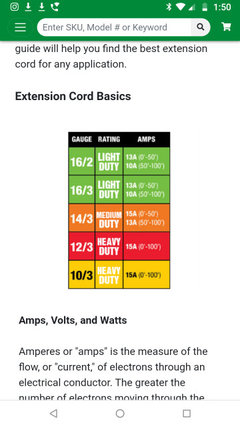 dvd94 thanked Seabornman
dvd94 thanked Seabornman dvd94
Original Author3 years agoThanks, seabornman! I think I am good to go! I've decided on the Champion generator - due to its 3 year warranty. It's gas only, unfortunately -- but for the price (which just went up $40 since we started this thread - lol!) and with an electric start and a few other cool features, I think it will serve me fine. I won't have to worry about space heaters with a direct cord to the furnace. Knowing my house will be warm is all I need for a few days. Thanks so much for all your help!
0- 3 years ago
In addition to boiler, you may have pumps on the various zones of the system. Are they on the boiler circuit?
0 dvd94
Original Author3 years agoboiler circuit? pumps? zones? oooh...that's out of my comfort zone! ;-) [remember this is a 'little old lady' - with very little mechanical knowledge - you are talking to :-) ] Like me, my house is simple :-) No zones, as far as I know. It is an old 1920 home with a natural gas fired furnace that circulates the hot water throughout the house through (old, antique - but beautiful) cast iron radiators - one per room. One continuous loop. One thermostat on the first floor of a two story house, controls the temperature for the entire house. Hope this answers your question - thanks for asking, if it helps!
0- 3 years agolast modified: 3 years ago
A bit late to this last comment - your radiators are either using hot water or steam. Steam systems usually don't have pumps, the steam rises up and condenses and flows down as water. Hot water systems usually need circulating pumps. You'd be able to see the pump on the pipes going out from the boiler. Guessing by age and a few other tidbits in your description, quite possibly steam.I'm not an expert though.
0 - 3 years ago
My old house, with hot water heat, doesn't have any pumps - the water circulates by convection only. During the several multi-day hurricane outages I endured, I was able to have heat, because electricity was not needed to run the heating system.
dvd94
Original Author3 years agoHow is that, mtvhike?? Your boiler ran without electricity? I don't think mine could ever do that. @armoured: I'm not sure - but I guess it is steam, based on your description. Or water, based on what mtvhike said? I do not hear - or see - any pumps, beyond what I presume is in the boiler. My system is totally silent when running, so I'm guessing steam. I do know that once a year I have to bleed each radiator until it spits water - that's about the extent of my mechanical expertise - lol!
Well, my Champion generator came in (!!) - wrong extension cord for the 30A connection - but that just came in yesterday (Tractor Supply even honored the $40 discount that was there the day before I placed the order). It's all set up and ready for a test; hopefully I'll get a chance to get the oil and gas in a few days and give it a try. ha ha!! Thanks so much, guys, for all your advice! Really appreciate it. ;-)0- 3 years ago
@dvd94 - if there's a pump on the hot water line from boiler, it should be pretty obvious, circular thing on the pipes. At any rate, there's two relevant ways it's important:
-you'll be disappointed if you got an emergency power solution and didn't think of the pump. If not, your boiler room will be nice and warm but the hot water not getting to the radiators - not much use in other words.
-if it's a steam system, you need a Steam Heat Guy. Not all boiler/heat specialists know these systems and they're becoming more rare. Nothing wrong with them but they have their nuances (like everything I guess).
If you haven't done in a while, you may want to get someone out to service it. (If you have someone who services they could confirm over the pone). More to have a person to call if something goes wrong down the road really - otherwise they're pretty reliable systems (at least that's what I understand). Anybody who deals with radiators will know the difference in a minute and help with the pump issue (if there is one); and if they say they don't know steam systems, hopefully will help you track somebody good down.
(You have natural gas so something has been done since whenever they brought gas to your area, at least replacing the boiler with one for natural gas - after the house was built, anyway - and hopefully you're in an area where these systems aren't rare.)
- 3 years ago
If your generator is gas as in gasoline, check with the manufacturer about the possibility of fueling it with aviation, as opposed to automobile, gas. Aviation gas doesn’t go “bad” as quickly and doesn’t have to be used and replaced as often if you don’t have to use it during an outage. You can’t fill your generator with automobile gas, let it sit for years and expect it to work when you have an outage.
- 3 years ago
dvd94, the original boiler had a pilot light. There was a thermocouple in the pilot light which created enough power to open and close the gas valve, when the thermostat called for more heat. The water flowed up to the radiators by convection only (hot water is less dense than cold). The pipes are 1-1/2 inches in diameter. A previous owner tried to extend the heat to new radiators in the sunroom with regular 3/4" pipe, and they never worked.
About 10 years ago, I replaced the boiler with a more efficient Weil McClain one, which worked essentially the same way, except that there were more complicated controls which did require power (still no pumps). When I lost power due to Sandy, I disconnected the controls from the house wiring and temporarily connected them to a battery-powered inverter to keep the controls running during the outage.
dvd94
Original Author3 years ago@armoured: I'm guessing if I have electric-powered pump(s) - that would stop running during an outage - there would be a wire(s) somewhere (either plugged in or hardwired) throughout the house. I have seen none of that. I've had my boiler replaced 3 times since I moved here in 1987 - my last time was in 2017. So far, none of the installers ever mentioned anything about pumps; I'm guessing they would need, at least, some maintenance or replacement in 30+ years. So, I don't think I have anything to worry about. [and @mtvhike] My older boilers were a bit finicky - they needed a certain, supposedly guaranteed, pressure to operate. But in the dead of winter and the draw from the town and nearby companies would start up in the morning - my pressure would drop and after several attempts would go into fail-safe - and never turn back on! :-) Now, with my new Navien that is no longer an issue. Everything is run/maintained by electronic circuitry - it is quite an amazing boiler - as boilers go. :-) Again - just one plug from the boiler and one plug from the condensate pump to a nearby standard receptacle. And again, the Navien specs say it needs up to 10A. Based on your last explanation, I'm more convinced I have steam.
@shivece: I did not know that aviation fuel lasted longer! Unfortunately I don't live too close to an airport - and during a power outage I wouldn't want to travel long distances to get fuel - which can be scarce, like during Sandy (shades of 1970s - during the gas crisis!). Plus, I'm guessing you'd need to have some authorization to pull up to a hanger and tell the guy to fill up my gas containers, please. :-) I'll do what regular folks do - go to my local Home Depot and pick up StaBil - izer stuff. :-) Super important for ethanol treated gas, anyway, since it ruins the 'plastic' fuel lines of these small motors - and plays havoc on everything, I've been told! That, and the Star Tron stuff, is supposed to be good for all small engines that are not used frequently. Supposedly gives gas over a year of shelf life. That is on my list to get when I pick up the oil and extra gas tanks that I'll need to be prepared.
Thanks for all your great input and stories :-) Now I just hope I'll never need it and it will sit around like everything else I bought that I never use. LOL! :-)0- 3 years ago
The pumps are usually pretty noticeable (they're not large but usually visible), so if you had one, you'd probably know. As @mtvhike pointed out, it is possible to have water systems that circulate without pumps (smaller ones?). There are some other telltale aspects to identify steam systems, but I'm not an expert. (I would think if steam the guys who installed your boilers would have mentioned, even if only to say "don't see as many of these anymore" but if you live in an area with a lot of them, maybe not)
Anyway main thing is to know whether or not you do have a pump - as I said, just to make sure they're on the circuit that gets power from your reserve generator. (They'd often be on the same circuit as the boiler room anyway, but just to avoid a second visit)
I think it wasn't uncommon in past to convert steam to water either so the age alone isn't the only factor. I think they did this conversion sometimes using the existing rads (but again, not an expert).
It is good to know though what you have.
0 dvd94
Original Author3 years ago@armoured: you are actually quite correct! When my first boiler needed repair, I had a heck of a time trying to find a qualified repairman. I even called the gas company and their repairman did not have a clue how my boiler worked. :-) I did find this surprising since the town that I live in is about 80% homes that were built before 1930. I am guessing that with each new owner of one of these old houses, folks would rip out the old radiators and replace the system. Although I'm not sure why - sure, they aren't the prettiest things to look at, with pipes running up the walls - but I find it to be almost maintenance free, super quiet, and very efficient. They may not look attractive, but they sure do a great job! The house has very even heat and my gas bill is less than a $1000 a year (including my water heater and dryer). p.s. I just spoke to my MacGyver-like friend - who knows my system better than most professionals in the area. He claims it is a water recirculating system; so now I have to find out if there are any pumps associated with it and find out how they run!!
0- 3 years ago
When they work well, they're great systems. I expect your MacGyver friend could tell you in a few minutes if there's a recirculating pump (I think they're all technically recirculating systems, just some have pumps and some don't). They're not usually hidden, and there's only so many places they could be - usually in the boiler room.
I almost am worried I've drawn too much attention to it as part of your backup power project, it should be clear. I have a system with pumps so that's why I think about it.
Also I need to get a generator set up.
dvd94 thanked armoured dvd94
Original Author3 years ago@amoured: I did just that! I sent photos of my entire system to my MacGyver friend - as a refresher as to what I have (he should have known - he's worked on it for years - but he wanted to be sure after I told him all the things you guys mentioned :-). Yes... it is water heated (not steam); yes, it has a recirculating pump - but it is attached to the 'boiler' (he says it's not called a boiler :-) - my original one was - but he says this one is not - go figure). The entire system runs as a unit - including the pump (hardwired to the furnace) - from just that one plugged in cord (and the condensate pump - separate). He explained how I will use the "30A socket" on the generator to run the furnace (or whatever it is called) and condensate pump (actually 15amp - because the extension cord splits - but that's ok because the furnace and the condensate pump do not draw much anyway) . The 20A plug will be for my fridge and ancillary things (router, modem, laptop/phone charger, one light). He explained if I want to use the microwave, I should unplug the fridge and use that cord for the microwave for a few minutes. He informed me to be sure to ground the generator to the outside water faucet. He reminded me to buy a lantern - because I'll have to fill the generator in the dark before I go to bed - lol :-)
- 3 years ago
I admit I'm confused why he says it's not a boiler (as far as I'm aware it's called a boiler even if it just heats and doesn't boil the water), but heck, I'm not going to argue with MacGyver!
Sounds like you've got it worked out and he knows the setup. Would definitely suggest trying it out before you have a blackout. And good advice on the lantern.
I had a minor issue the first time I needed to use my generator, which is in my garage - the garage doors are electric and I didn't know how to open them manually. Wasn't that hard to do or even figure out, but I'd never done it before, and doing it in a dark garage added one more stress point (since I was also under some time pressure). I hadn't thought of that during my test run.
0 - 3 years agolast modified: 3 years ago
dvd94,I'd like to tell you how I've prepared for an emergency due to a power outage. It gets very cold here in Minnesota so my primary concerns are food, water and heat if the power goes out in the winter. Secondary concern is electricity basically to get water from my well and keep the freezer/refrigerators going. ( I also have bottled water on hand).
For heat I installed a nice wood burning stove at a time (1999). I no longer use the wood burner but can if I needed it in an emergency. But you don't have a wood stove so read on. I also have a natural gas space heater in storage. If I ever need to use it I'll connect it to a gas valve I installed in the house to keep from freezing as long as the gas still flows.
For food I always keep a well stocked pantry (at least a 6 month supply) but my water comes from a well so I still need electricity.
For electricity I have 3.5Kiliwatt gas powered Generac generator and I always keep 40 gallons of gas on hand. I rotate the gas ever 6 months and works good with no issues over the past 20 years. 3.5KW's works good to run the well, freezer/frig, a TV and PC along with a few LED lights, anything more and I'm pushing it. I've had to turn to the generator 4 or 5 times in the past (thankfully never in the winter) and what I learned over the last 20 years is not to advertise your resources, it's not wise.
The times I ran the generator the neighbors would all come over and stare at the generator and each would finally ask to use it. What could I say? I agreed to each one when I got my refrigeration down to temperature. Each time after the outage I told each of the neighbors they really should buy a back up generator but no one ever did.
After a long outage 5 years ago it was the last straw! I had 5 neighbors staring at my generator and all wanted to take it home and they began arguing who would get it first. OMG! The power was out 16 hours with just one getting to use my generator before the lights came back on, and I again reminded them all to think about buying a generator.
I put the generator in a detached building and fed wires to the house underground. It's barley audible from the outside and out of sight. We had one short outage since then, I fired up the generator and left the lights off, not long after I could here a neighbor telling his wife I "don't see any lights on next door or hear his generator". Some people never learn and none to this day have yet to buy a generator, not one! I wouldn't turn someone away that was cold or hungry but decided not to advertise I have a generator for emergencies, it could cause problems I just don't want to deal with and my resources are limited. Think about this and the number of unprepared neighbors living around you that may want your resources to take home, it's sad but true.
0 - 3 years agolast modified: 3 years ago
Why pay for empowerment... if you can borrow it free when, infrequently, you have need?
Five to ten bucks (or whatever) an hour to use your generator, to folks you've suggested that they consider getting their own, four times or more.
(Names and dates of suggestions collected on a board you can show them?)
Or suggest that three or four get together and buy one, with at least one having a place to store it in the meantime. Three owners would mean each getting almost eight hours of service daily, with not too much trouble to move, as during a prolonged outage many workers are staying home.
Or - if three or four will lend you $100. - 150. each, you buy one and rent it to them at whatever rate you agree on per hour (higher rates for non-lenders), keeping track of each account , and when each lender has paid you, maybe, double the amount of the loan, it is cancelled and she/he owns part of the machine. Your choice as to whether the paid-off lenders, now part owners, pay (reduced) user fees any more, depending partly on the share of the original cost was your money, and share in fees paid by non- lenders.
Participation or non-such, frequently develops consequences.
Some people around here have a pressured kerosene fired small lantern, a number by Coleman, with a tank holdiing about a pint, lasting a number of hours (8 - 10? - I don't remember) at the bottom with a small pipe leading upward to feed a couple of mantles, and there's a small cup on the feed pipe into which one pours a bit of alcohol that heats the kerosene, then lights it. It provides substantial good dependable light, makes a bit of a hissing sound when operating and throws a substantial amount of heat.
Pressure pump on the tank and a handle that swings up to carry the lantern around.
ole joyful
0

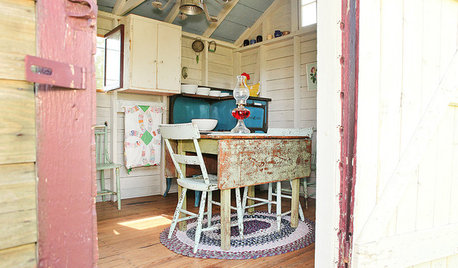
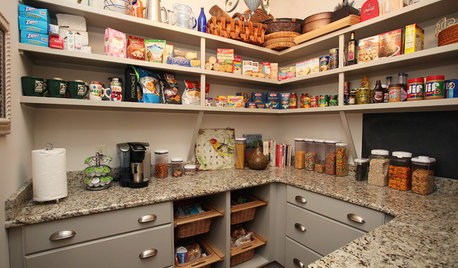
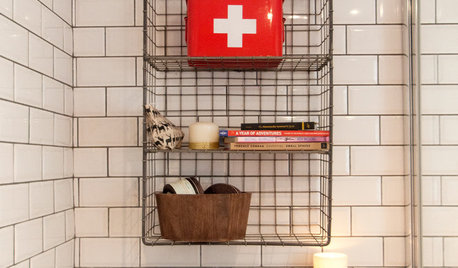

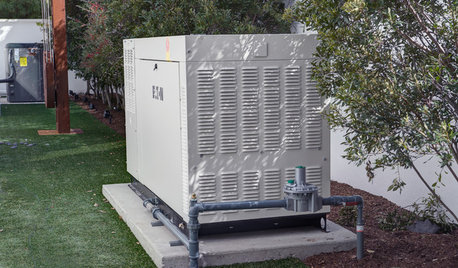
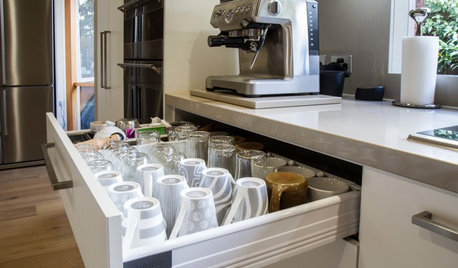
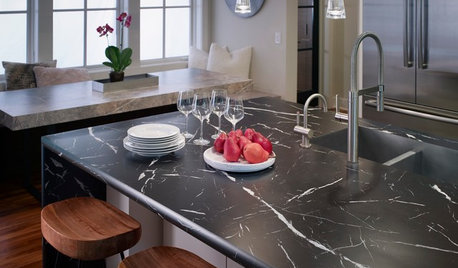
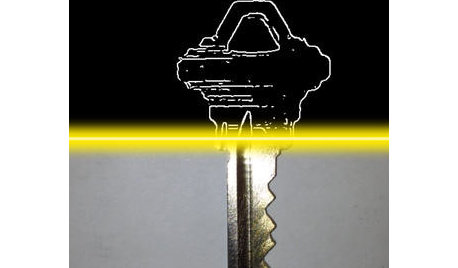




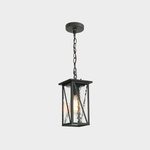


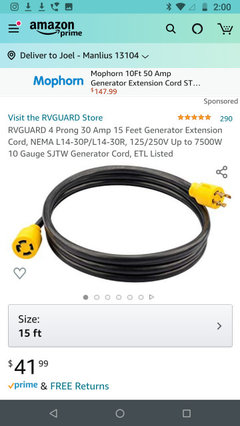
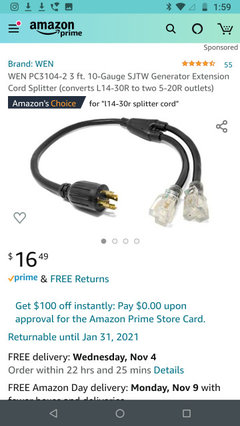
dvd94Original Author